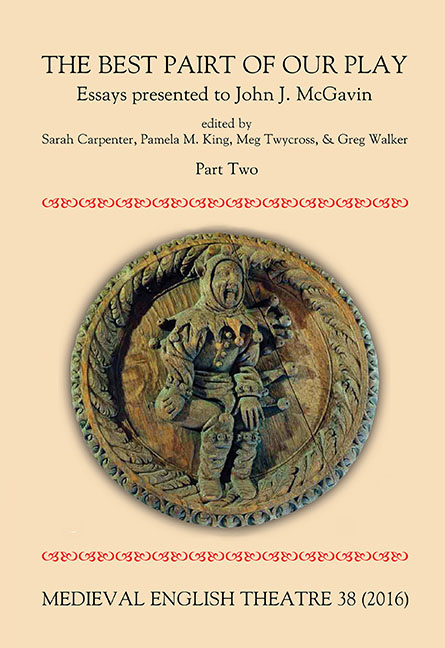 Medieval English Theatre 38
Medieval English Theatre 38 Published online by Cambridge University Press: 20 April 2017
Shakespeare's Julius Caesar opens with Flavius addressing the audience, telling them: ‘Hence! Home, you idle creatures get you home: | Is this a holiday?’ For a second, the imagined audience is probably startled by the suggestion that they should be at work rather than at the theatre. It is only when the character called ‘First Commoner’ answers Flavius that the spectator is given the space to distance themselves from the sense of being addressed directly. Such direct address, amusing in what is quintessentially a play about rhetoric, in other plays served the practical and more serious function of placing spectators into a doctrinal frame of mind, such as in the N.Town Woman taken in Adultery, in which the character Jesus directly addresses the members of the audience with a message about their sins: ‘Man, for thy sin take repentance’. Tudor Great Hall interludes also show that actors used direct address at the openings of plays to ‘claim’ the performance space, because it was a space that was normally used for other activities, such as eating or socialising. For example, Henry Medwall's Fulgens and Lucres opens with the character ‘A’ playfully reprimanding the audience that they are not enthusiastic enough, considering that they have just had a free dinner:
A, for Goddis will, What meane ye, syrs, to stond so still? Have not ye etyn and your fill And payd no thinge therfore?
In recent years two very strong theoretical streams have emerged in critical studies, which try to explain the relationship between the two worlds of drama — the fictional one on stage and the real world which is brought to the performance by the spectator. One stream focuses on the artificial onstage world, although it acknowledges spectators experiencing affect. The second privileges spectators’ complete emotional absorption in the performance, while allowing for occasional release from this absorption. I am talking about, respectively, metatheatricality and cognitive theory. In this article, I will examine how each of these helps us to understand the relationship between spectators and performances, and will argue that these theories are most valuable to us both when they support historicist readings of the plays, and when one also considers the liminal area between the two poles of play-world and real world, artifice and absorption.
To save this book to your Kindle, first ensure [email protected] is added to your Approved Personal Document E-mail List under your Personal Document Settings on the Manage Your Content and Devices page of your Amazon account. Then enter the ‘name’ part of your Kindle email address below. Find out more about saving to your Kindle.
Note you can select to save to either the @free.kindle.com or @kindle.com variations. ‘@free.kindle.com’ emails are free but can only be saved to your device when it is connected to wi-fi. ‘@kindle.com’ emails can be delivered even when you are not connected to wi-fi, but note that service fees apply.
Find out more about the Kindle Personal Document Service.
To save content items to your account, please confirm that you agree to abide by our usage policies. If this is the first time you use this feature, you will be asked to authorise Cambridge Core to connect with your account. Find out more about saving content to Dropbox.
To save content items to your account, please confirm that you agree to abide by our usage policies. If this is the first time you use this feature, you will be asked to authorise Cambridge Core to connect with your account. Find out more about saving content to Google Drive.